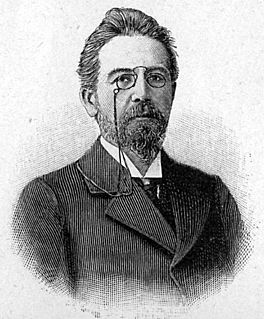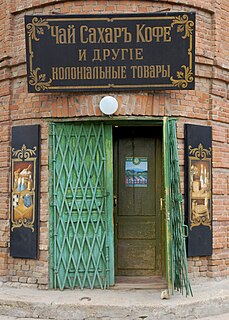
The Seagull is a play by Russian dramatist Anton Chekhov, written in 1895 and first produced in 1896. The Seagull is generally considered to be the first of his four major plays. It dramatises the romantic and artistic conflicts between four characters: the famous middlebrow story writer Boris Trigorin, the ingenue Nina, the fading actress Irina Arkadina, and her son the symbolist playwright Konstantin Tréplev.

Uncle Vanya is a play by the Russian playwright Anton Chekhov. It was first published in 1898 and received its Moscow première in 1899 in a production by the Moscow Art Theatre, under the direction of Konstantin Stanislavski.

The Cherry Orchard is the last play by Russian playwright Anton Chekhov. Written in 1903, it was first published by Znaniye, and came out as a separate edition later that year in Saint Petersburg, via A.F. Marks Publishers. It opened at the Moscow Art Theatre on 17 January 1904 in a production directed by Konstantin Stanislavski. Chekhov described the play as a comedy, with some elements of farce, though Stanislavski treated it as a tragedy. Since its first production, directors have contended with its dual nature. It is often identified as one of the three or four outstanding plays by Chekhov, along with The Seagull, Three Sisters, and Uncle Vanya.
Chekhov's gun is a dramatic principle that states that every element in a story must be necessary, and irrelevant elements should be removed; elements should not appear to make "false promises" by never coming into play. The statement is recorded in letters by Anton Chekhov several times, with some variation:

Olga Leonardovna Knipper-Chekhova was a Russian and Soviet stage actress. She was married to Anton Chekhov.
Ivanov is a four-act drama by the Russian playwright Anton Chekhov.
Boris Ivanovich Tishchenko was a Russian and Soviet composer and pianist.

The Chekhov Gymnasium in Taganrog on Ulitsa Oktyabrskaya 9 is the oldest gymnasium in the South of Russia. Playwright and short-story writer Anton Chekhov spent 11 years in the school, which was later named after him and transformed into a literary museum. Visitors can see Anton's desk and his classroom, the assembly hall and even the punishment cell which he sometimes visited.

Argo Aadli is an Estonian theatre and film actor.

This is a partial list of Anton Chekhov's works:

On the Harmful Effects of Tobacco is a one-act play by Anton Chekhov. It has one character, Ivan Ivanovich Nyukhin. First published in 1886, the play was revised by Chekhov and is best known from his 1902 version. This was first published in English in The Unknown Chekhov (1954), a collection of writings.

The Chekhov Shop is a museum in Taganrog, Russia. This is a two-storey house where the famous Russian writer Anton Chekhov stayed with his family from 1869 to 1874.

Fragments was a Russian humorous, literary and artistic weekly magazine published in St Petersburg from 1881 to 1916.

Melikhovo is a writer's house museum in the former country estate of the Russian playwright and writer Anton Chekhov. Chekhov lived in the estate from March 1892 until August 1899, and it is where he wrote some of his most famous plays and stories, including The Seagull and Uncle Vanya. The estate is about forty miles south of Moscow near Chekhov.
The Wood Demon is a comedic play in four acts by Anton Chekhov.

"Ionych" is an 1898 short story by Anton Chekhov.
"On Official Duty" is an 1899 short story by Anton Chekhov.












